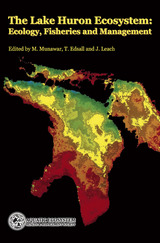3 books by Edsall, T.

The Lake Huron Ecosystem
Ecology, Fisheries and Management
M. Munawar
Michigan State University Press, 1995
Lake Huron is the second largest of the Great Lakes and the fifth largest lake in the world (surface area: 59,000 km2). It is also one of the least known lakes in the Great Lakes system in terms of limnology and food web dynamics. To rectify this, the Aquatic Ecosystem Health and Management Society organized an international symposium in September 1993, which they followed with the publication of this peer-reviewed book. In total, forty-five papers were presented during the conference on topics ranging from microbial ecology, the role of exotic species, and sediment toxicology, to fisheries and wildlife of Lake Huron and its basin. With few existing comprehensive reports on the limnology and fisheries of Lake Huron, this detailed book helps bridge the information gap by introducing a multidisciplinary and ecosystematic approach to Great Lake (particularly Lake Huron) research.
[more]

Out of Many, One
Obama and the Third American Political Tradition
Ruth O'Brien
University of Chicago Press, 2013
Feared by conservatives and embraced by liberals when he entered the White House, Barack Obama has since been battered by criticism from both sides. In Out of Many, One, Ruth O’Brien explains why. We are accustomed to seeing politicians supporting either a minimalist state characterized by unfettered capitalism and individual rights or a relatively strong welfare state and regulatory capitalism. Obama, O’Brien argues, represents the values of a lesser-known third tradition in American political thought that defies the usual left-right categorization.
Bearing traces of Baruch Spinoza, John Dewey, and Saul Alinsky, Obama’s progressivism embraces the ideas of mutual reliance and collective responsibility, and adopts an interconnected view of the individual and the state. So, while Obama might emphasize difference, he rejects identity politics, which can create permanent minorities and diminish individual agency. Analyzing Obama’s major legislative victories—financial regulation, health care, and the stimulus package—O’Brien shows how they reflect a stakeholder society that neither regulates in the manner of the New Deal nor deregulates. Instead, Obama focuses on negotiated rule making and allows executive branch agencies to fill in the details when dealing with a deadlocked Congress. Similarly, his commitment to difference and his resistance to universal mandates underlies his reluctance to advocate for human rights as much as many on the Democratic left had hoped.
Bearing traces of Baruch Spinoza, John Dewey, and Saul Alinsky, Obama’s progressivism embraces the ideas of mutual reliance and collective responsibility, and adopts an interconnected view of the individual and the state. So, while Obama might emphasize difference, he rejects identity politics, which can create permanent minorities and diminish individual agency. Analyzing Obama’s major legislative victories—financial regulation, health care, and the stimulus package—O’Brien shows how they reflect a stakeholder society that neither regulates in the manner of the New Deal nor deregulates. Instead, Obama focuses on negotiated rule making and allows executive branch agencies to fill in the details when dealing with a deadlocked Congress. Similarly, his commitment to difference and his resistance to universal mandates underlies his reluctance to advocate for human rights as much as many on the Democratic left had hoped.
By establishing Obama within the context of a much longer and broader political tradition, this book sheds critical light on both the political and philosophical underpinnings of his presidency and a fundamental shift in American political thought.
[more]

State of Lake Michigan
Ecology, Health, and Management
T. Edsall
Michigan State University Press, 2005
State of Lake Michigan is part of the Ecovision World Monograph Series, which is devoted to exploring the state, ecology, and integrity of the lakes. It is the formal outcome of an international symposium on Lake Michigan, organized by the Aquatic Ecosystem Health and Management Society, and chaired by T. Edsall and M. Munawar.
State of Lake Michigan reviews the status of the major Lake Michigan ecosystem components and provides a basis for evaluating the health of the lake and for promoting integrated management of this exceptional natural resource. The book consists of papers by professionals in the Great Lakes region who are recognized for their contributions to the advancement of Great Lakes science and management. The book also includes an extensive subject index. Other sections explore physical and chemical regimes, food web, water birds, wetlands, and management and initiatives.
State of Lake Michigan reviews the status of the major Lake Michigan ecosystem components and provides a basis for evaluating the health of the lake and for promoting integrated management of this exceptional natural resource. The book consists of papers by professionals in the Great Lakes region who are recognized for their contributions to the advancement of Great Lakes science and management. The book also includes an extensive subject index. Other sections explore physical and chemical regimes, food web, water birds, wetlands, and management and initiatives.
[more]
READERS
Browse our collection.
PUBLISHERS
See BiblioVault's publisher services.
STUDENT SERVICES
Files for college accessibility offices.
UChicago Accessibility Resources
home | accessibility | search | about | contact us
BiblioVault ® 2001 - 2024
The University of Chicago Press









